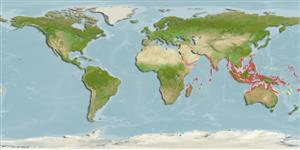Teleostei (teleosts) >
Beloniformes (Needle fishes) >
Exocoetidae (Flyingfishes)
Etymology: Cypselurus: Greek, kypselos, ou = swift + Greek,oura = tail (Ref. 45335).
More on author: Bleeker.
Environment: milieu / climate zone / depth range / distribution range
Ecology
Marine; pelagic-neritic; oceanodromous (Ref. 51243); depth range 0 - 20 m. Tropical; 25°N - 25°S
Indo-West Pacific: tropical waters from East Africa to southern China, Solomon Islands and Queensland, Australia.
Length at first maturity / Size / Weight / Age
Maturity: Lm 22.9, range 23 - 23.29 cm
Max length : 27.7 cm TL male/unsexed; (Ref. 11441)
Occurs in near-shore surface waters, never spread to open sea. Feeds on zooplankton and small fish (Ref. 9839). Capable of leaping out of the water and gliding above the surface (Ref. 30573). Used in Chinese medicine (Ref. 12166).
Life cycle and mating behavior
Maturity | Reproduction | Spawning | Eggs | Fecundity | Larvae
Parin, N.V., 1996. On the species composition of flying fishes (Exocoetidae) in the West-Central part of tropical Pacific. J. Ichthyol. 36(5):357-364. (Ref. 27313)
IUCN Red List Status (Ref. 130435: Version 2024-1)
Threat to humans
Harmless
Human uses
Fisheries: minor commercial
Tools
Special reports
Download XML
Internet sources
Estimates based on models
Preferred temperature (Ref.
123201): 26.3 - 29.3, mean 28.6 °C (based on 2766 cells).
Phylogenetic diversity index (Ref.
82804): PD
50 = 0.5002 [Uniqueness, from 0.5 = low to 2.0 = high].
Bayesian length-weight: a=0.00631 (0.00288 - 0.01384), b=3.05 (2.85 - 3.25), in cm total length, based on LWR estimates for this (Sub)family-body shape (Ref.
93245).
Trophic level (Ref.
69278): 4.0 ±0.65 se; based on food items.
Resilience (Ref.
120179): High, minimum population doubling time less than 15 months (Preliminary K or Fecundity.).
Fishing Vulnerability (Ref.
59153): Low vulnerability (18 of 100).
